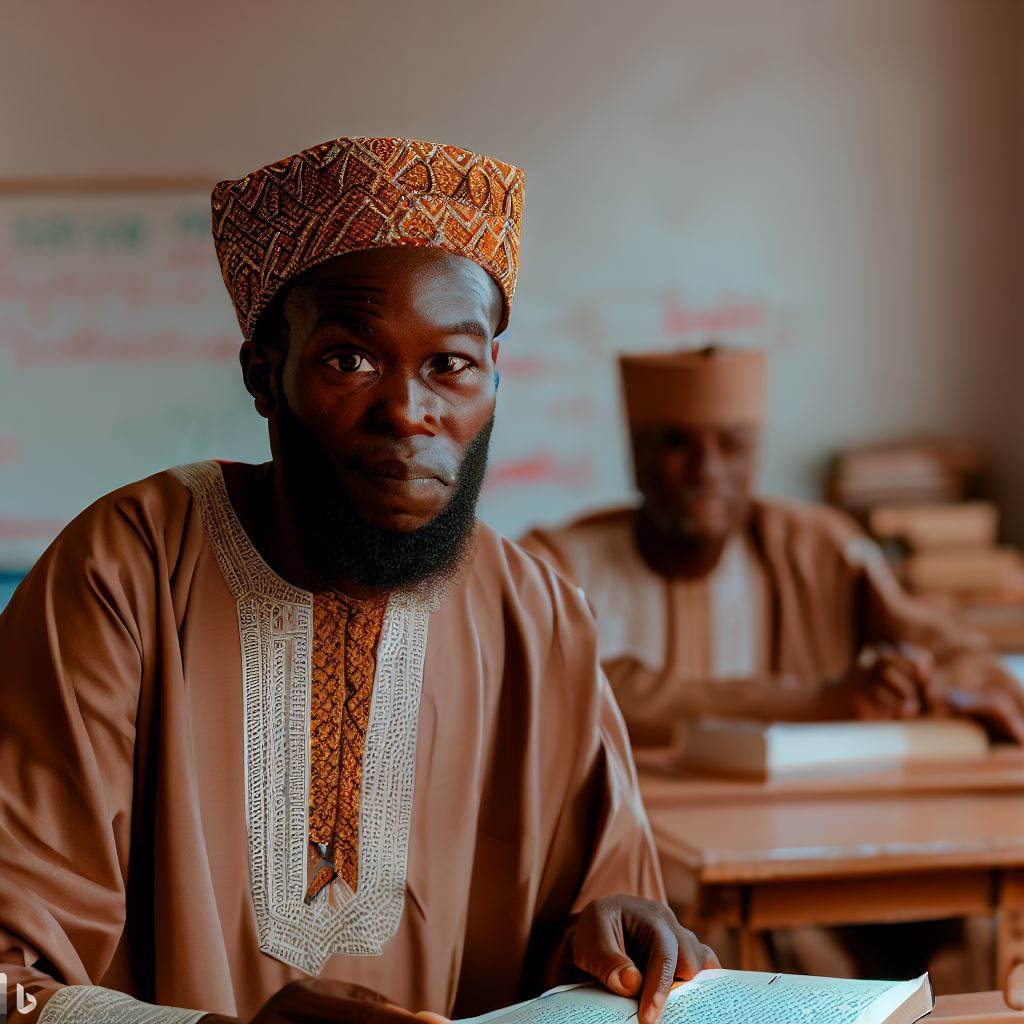Introduction
The teaching profession in Northern Nigeria is a vital aspect of the region’s education system.
Understanding the teaching profession in Northern Nigeria is crucial for educational development in the region.
The teaching profession in Northern Nigeria plays a pivotal role in shaping the region’s educational landscape.
With a rich history and cultural diversity, Northern Nigeria’s education system faces unique challenges and opportunities.
Exploring the teaching profession in this context sheds light on the crucial role educators play in molding future generations.
As we delve into the intricacies of teaching in Northern Nigeria, we gain insights into the challenges teachers face and the innovative approaches they adopt to impart knowledge.
This exploration not only deepens our understanding of the teaching profession but also highlights its significance in fostering social and economic development in the region.
Northern Nigeria has a diverse education system with a mix of public and private schools, where teachers play a significant role.
Historical Context
The development of education in Northern Nigeria
Education in Northern Nigeria has a rich history that dates back many centuries. It has evolved significantly over time, adapting to the changing needs and influences of society.
In the early days, education in Northern Nigeria was primarily centered around traditional educational practices.
These practices focused on teaching children important skills and values necessary for survival in their communities.
Influence of traditional educational practices and Islamic teachings
One of the key influences on education in Northern Nigeria has been Islamic teachings. Islam has long played a prominent role in the region and has greatly shaped the education system.
Islamic schools, known as madrasas, were established to educate students on Islamic principles and teachings.
Introduction of Western education and its impact
However, in the 19th century, the introduction of Western education had a profound impact on the educational landscape of Northern Nigeria.
Western-style schools were established by Christian missionaries and colonial administrators, bringing new methods of teaching and curriculum.
This introduction of Western education brought about both positive and negative effects. On one hand, it provided opportunities for students to gain knowledge in subjects such as math, science, and English.
It also opened up new possibilities for further education and career opportunities.
On the other hand, the rapid spread of Western education led to a decline in the prominence of traditional education and Islamic teachings.
Many young people were drawn toward the allure of modernity and the prospects it promised.
Additionally, the colonial influence on education in Northern Nigeria created a system that favored English language proficiency and Western ideals, often neglecting the cultural and linguistic diversity of the region.
Despite these challenges, education in Northern Nigeria has continued to grow and evolve.
Efforts have been made to strike a balance between preserving traditional knowledge and incorporating modern educational practices.
Islamic schools have remained an important part of the education system, coexisting with Western-style schools.
In recent years, there has been a greater emphasis on the importance of inclusive and culturally relevant education.
The government and various organizations are working to develop policies and programs that cater to the unique needs and aspirations of students in Northern Nigeria.
Overall, the historical context of education in Northern Nigeria reveals a complex mix of influences and challenges.
It highlights the importance of understanding the region’s rich educational heritage while also adapting to the demands of a changing world.
Read: Teachers and the Nigerian Curriculum: A Critical Study
Educational Requirements and Qualifications
Academic qualifications needed to become a teacher in Northern Nigeria
In Northern Nigeria, becoming a teacher requires meeting certain educational requirements and qualifications.
Academic qualifications are crucial to enter the teaching profession. An individual aspiring to be a teacher should hold at least a Bachelor’s degree in Education or a related field.
Specialization in a specific subject, such as Mathematics, Science, English, or Social Studies, might be necessary depending on the desired teaching position.
During the undergraduate program, prospective teachers should demonstrate strong academic performance, especially in subjects relevant to their chosen specialization.
Additionally, they need to showcase effective communication and teaching skills through practical assessments.
This ensures that only competent individuals who can effectively deliver knowledge and engage students enter the profession.
Mandatory teaching certification processes and agencies
In terms of mandatory teaching certification processes, aspiring teachers must complete a teaching certification program approved by the Nigerian Teachers Registration Council (TRCN).
The TRCN is the regulatory body responsible for overseeing the teaching profession in Northern Nigeria. To obtain the teaching license, applicants need to pass the TRCN Professional Qualifying Examination.
This examination assesses their knowledge and understanding of pedagogical principles and practices.
Once licensed, teachers are expected to engage in continuous professional development to enhance their teaching skills and stay updated with the latest educational practices.
This often involves participating in workshops and seminars organized by the TRCN or other relevant educational institutions.
By continuously improving their expertise, teachers can provide high-quality education to their students.
Special skills or background knowledge required in certain subjects
Certain subjects may require special skills or background knowledge beyond the general educational requirements.
For example, Mathematics and Science teachers need to have a strong foundation in logical reasoning and problem-solving skills.
English and Literature teachers should be proficient in reading, writing, and analyzing texts. Social Studies teachers need a broad understanding of historical and cultural contexts.
Additionally, specialized subjects like Computer Science may require specific knowledge such as computer programming.
Moreover, teachers should possess the ability to adapt their teaching methods to cater to the diverse needs of students with different learning styles.
This inclusivity ensures that all students have equal opportunities to learn and succeed.
In the end, to become a teacher in Northern Nigeria, academic qualifications, teaching certification, and subject-specific skills are essential.
By meeting these requirements, individuals can embark on a rewarding and impactful career in education, shaping the minds of future generations.
Read: Impact of Technology on the Teaching Profession in Nigeria
Key Challenges Faced by Teachers
Lack of proper infrastructure and resources in schools
- Teachers in Northern Nigeria face the challenge of inadequate infrastructure and resources in schools.
- Classrooms are often overcrowded, lacking proper seating arrangements and ventilation.
- Many schools lack basic amenities like clean water, electricity, and functional toilets.
- The absence of libraries and laboratories hinders the practical learning experience for students.
- Without proper infrastructure, teachers find it difficult to create a conducive learning environment.
Insufficient teaching materials and technological tools
- Teachers in Northern Nigeria often do not have access to the necessary teaching materials.
- Textbooks, notebooks, and stationery are often in short supply, limiting students’ learning opportunities.
- With a lack of technological tools, teachers struggle to incorporate modern teaching methods.
- The absence of computers, projectors, and internet connectivity hinders interactive and visual learning.
- Teachers have to rely on outdated materials, limiting their effectiveness in delivering quality education.
Unfavorable working conditions and low salaries
Teachers in Northern Nigeria face unfavorable working conditions that affect their motivation and performance.
The lack of proper facilities, such as staff rooms and rest areas, contributes to their discontent. Their workload is often overwhelming, with large class sizes and administrative responsibilities.
Additionally, teachers’ salaries are insufficient, leading to financial difficulties and low job satisfaction. The combination of poor working conditions and low salaries makes the teaching profession less attractive.
In fact, teachers in Northern Nigeria encounter various challenges that hinder their effectiveness in the classroom.
The lack of proper infrastructure and resources, insufficient teaching materials and technological tools, as well as unfavorable working conditions and low salaries, affect both teachers’ well-being and students’ learning experience.
Efforts should be made by the government and relevant stakeholders to address these challenges to ensure quality education in the region.
Read: The Nigerian National Teachers Institute: A Closer Look
Cultural Factors Impacting the Teaching Profession
Gender Bias and Limitations for Female Teachers
- Female teachers in Northern Nigeria face gender bias and limitations in their profession.
- Society often views teaching as a job for women, limiting opportunities for career advancement.
- Traditional gender roles and expectations place constraints on female teachers.
- Gender bias affects the recruitment and retention of female teachers in the Northern Nigerian education system.
- Limited access to quality education and resources further hinders female teachers’ professional development.
Influence of Cultural Norms on Education and Classroom Dynamics
- Cultural norms play a significant role in shaping the education system and classroom dynamics in Northern Nigeria.
- The emphasis on respect for authority and elders influences teacher-student relationships.
- Students are expected to show deference to their teachers and adhere to strict discipline.
- The hierarchical nature of the system may hinder open communication and student engagement.
- Cultural norms prioritize rote learning over critical thinking and creativity, impacting teaching methods.
Balancing Traditional Values with Modern Teaching Methods
Teachers in Northern Nigeria face the challenge of reconciling traditional values with modern teaching methods.
Incorporating local culture and traditions into the curriculum can enhance students’ learning experiences.
However, adapting to new teaching approaches can be perceived as a threat to traditional values. Teachers need to find a balance between preserving cultural heritage and promoting 21st-century skills.
Collaboration between educators, parents, and community leaders is vital to navigating this challenge.
In a nutshell, the teaching profession in Northern Nigeria is impacted by various cultural factors.
Gender bias and limitations for female teachers hinder their career growth, while cultural norms shape education and classroom dynamics.
Teachers must navigate the balance between preserving traditional values and adopting modern teaching methods.
Collaborative efforts are needed to create an inclusive and effective education system in Northern Nigeria.
Read: Inclusive Education: The Role of Teachers in Nigeria

Support and Professional Development for Teachers
Government initiatives and programs to improve teaching standards
The government of Northern Nigeria has implemented various initiatives and programs to enhance the teaching standards.
These efforts focus on providing support to teachers in order to improve their teaching skills and effectiveness.
One such program is the establishment of Teacher Training Centers across the region.
These centers offer professional development opportunities and trainings to enhance teachers’ subject knowledge and pedagogical skills.
Additionally, the government has initiated mentoring programs, where experienced teachers guide and support novice teachers in their professional growth.
The government has allocated funds to provide necessary teaching resources, such as textbooks and teaching aids, to schools and teachers.
These initiatives aim to create a conducive environment for teachers to excel and improve the quality of education in Northern Nigeria.
Training and capacity-building opportunities for teachers
In addition to government programs, various organizations and institutions offer training and capacity-building opportunities for teachers.
These programs focus on enhancing teachers’ knowledge and skills, as well as equipping them with innovative teaching methods.
Teacher workshops and seminars are organized regularly to address specific challenges faced by teachers in the region.
Furthermore, there are online platforms and resources available for teachers to access educational materials and participate in virtual training programs.
These opportunities not only enhance teachers’ professional development but also enable them to stay updated with the latest educational practices.
Role of professional associations in Northern Nigeria
Professional associations play a crucial role in supporting and advocating for teachers’ professional development in Northern Nigeria.
These associations provide a platform for teachers to network, share resources, and exchange best practices.
They also organize conferences and workshops to facilitate discussions on current educational issues and promote continuous learning among teachers.
Professional associations actively engage with policymakers and government bodies to influence policies related to the teaching profession.
Through their collaborative efforts, these associations aim to raise the status of teachers and ensure their voice is heard in decision-making processes.
Furthermore, professional associations provide mentorship programs for young teachers and help them navigate their professional journey.
These initiatives contribute to the overall growth and development of teachers in Northern Nigeria.
In review, the teaching profession in Northern Nigeria is supported by various government initiatives, training programs, and professional associations.
These efforts strive to enhance teaching standards, provide opportunities for professional development, and create a supportive environment for teachers.
Through continuous support and investment in teachers’ growth, the education system in Northern Nigeria can evolve and thrive.
Publish Your Professional Profile, Business or Brand
Showcase your expertise, gain trust, and boost visibility instantly on Professions.ng.
Publish NowSuccess Stories and Inspirational Teaching Practices
In this section, we will highlight the outstanding teachers who are making a remarkable difference in Northern Nigeria through their innovative teaching methods and approaches.
We will also delve into the positive impact these teachers have on students and communities.
Outstanding Teachers Making a Difference in Northern Nigeria
- Mr. Musa: A primary school teacher in Kano who transformed his classroom into a vibrant learning environment.
- Ms. Aisha: A secondary school teacher in Sokoto who inspires her students through her passion for literature.
- Mr. Ibrahim: An Islamic Studies teacher in Zamfara who implements experiential learning in his lessons.
- Ms. Fatima: A math teacher in Kaduna who organizes interactive activities to engage her students.
- Mr. Abdullahi: A science teacher in Borno who encourages his students to pursue careers in STEM.
These teachers go beyond the traditional teaching methods and create a stimulating classroom environment where students thrive and discover their potential.
Read: Insights into the Teaching Profession in Nigeria Today
Innovative Teaching Methods and Approaches Being Implemented
- Collaborative Learning: Teachers across Northern Nigeria are implementing collaborative learning techniques, encouraging students to work together and learn from each other.
- Interactive Technology: Teachers are incorporating interactive technology such as smart boards and online platforms to enhance the teaching and learning experience.
- Project-Based Learning: Many teachers are adopting project-based learning to develop critical thinking and problem-solving skills among their students.
- Cultural Integration: Teachers are integrating the rich cultural heritage of Northern Nigeria into their lessons, creating a deeper connection between students and their learning material.
Positive Impact on Students and Communities
The success stories and inspirational teaching practices in Northern Nigeria have led to several positive impacts:
- Improved Academic Performance: Students taught by these outstanding teachers have shown significant improvements in their academic performance.
- Boosted Confidence and Self-esteem: The innovative teaching methods and personalized attention provided by these teachers have boosted students’ confidence and self-esteem.
- Enhanced Creativity and Innovation: By incorporating interactive methods, teachers have nurtured creativity and innovation among students, enabling them to think outside the box.
- Community Engagement: These outstanding teachers actively engage with the community, organizing workshops and events to promote education and create awareness.
- Inspiring Future Educators: The exceptional teaching practices showcased by these teachers have inspired many students to pursue a career in education, ensuring the continuity of impactful teaching in the region.
These success stories and inspirational teaching practices in Northern Nigeria serve as a testament to the immense dedication and passion of the region’s educators.
They are shaping not only the academic futures of their students but also uplifting their communities.
Read: A Comprehensive Overview of Special Education in Nigeria
Conclusion
Teaching profession in Northern Nigeria has challenges and opportunities. It plays a vital role in shaping the future generations and promoting education.
Delving into the teaching profession in Northern Nigeria uncovers a world of dedication, challenges, and resilience.
Educators in this region are shaping young minds, often amidst resource constraints and cultural diversity.
Their commitment to imparting knowledge is laying the foundation for the region’s future.
The exploration of the teaching profession in Northern Nigeria underscores the importance of addressing educational disparities and supporting teachers in their noble mission.
As we continue to understand the complexities and nuances of teaching in this context, we recognize the transformative power of education in shaping societies and driving progress.
Investing in teacher training, providing resources, and promoting a positive environment for learning.




